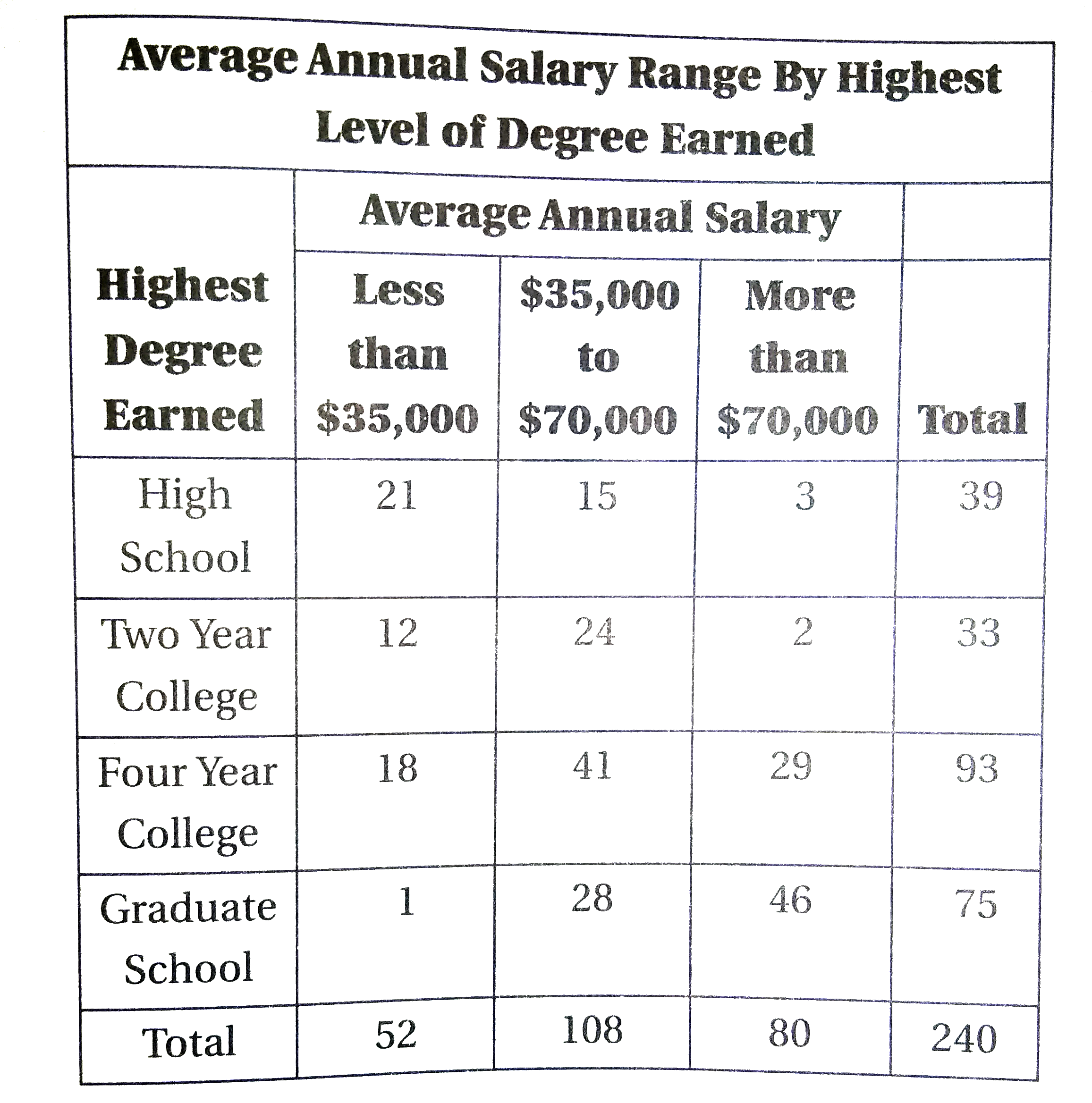
The table above summarizes the result of a survey taken in which 240 adults were asked about their education level and current annual salary. If a participant who reported earning $35,000 or more per year is selected at random, what is the best estimate of the probability that the person does not have a graduate school degreee?
0.31
0.40
0.60
0.69
The correct Answer is:C
Step by step video, text & image solution for The table above summarizes the result of a survey taken in which 240 adults were asked about their education level and current annual salary. If a participant who reported earning $35,000 or more per year is selected at random, what is the best estimate of the probability that the person does not have a graduate school degreee? by Maths experts to help you in doubts & scoring excellent marks in Class 12 exams.
Topper's Solved these Questions
Similar Questions
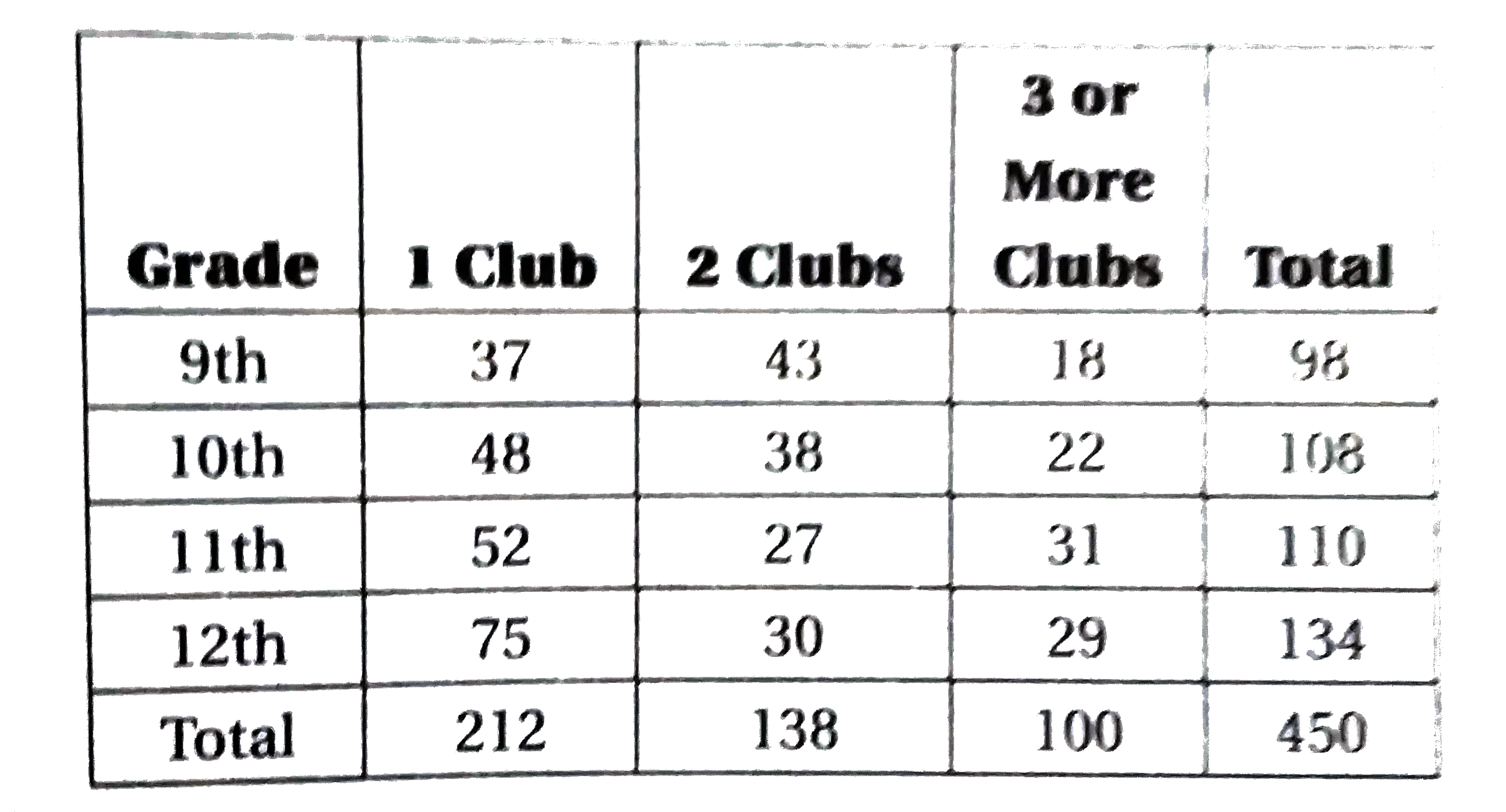
Question 4-6 refer to the above table, which summarizes the result of a survey of the student body of a high school about club membership in which each student enrolled in the high school enumerated the clubs in which they were members.
Q. If a students is selected at random, what is the probability that the student does not belong to 3 or more clubs?View Solution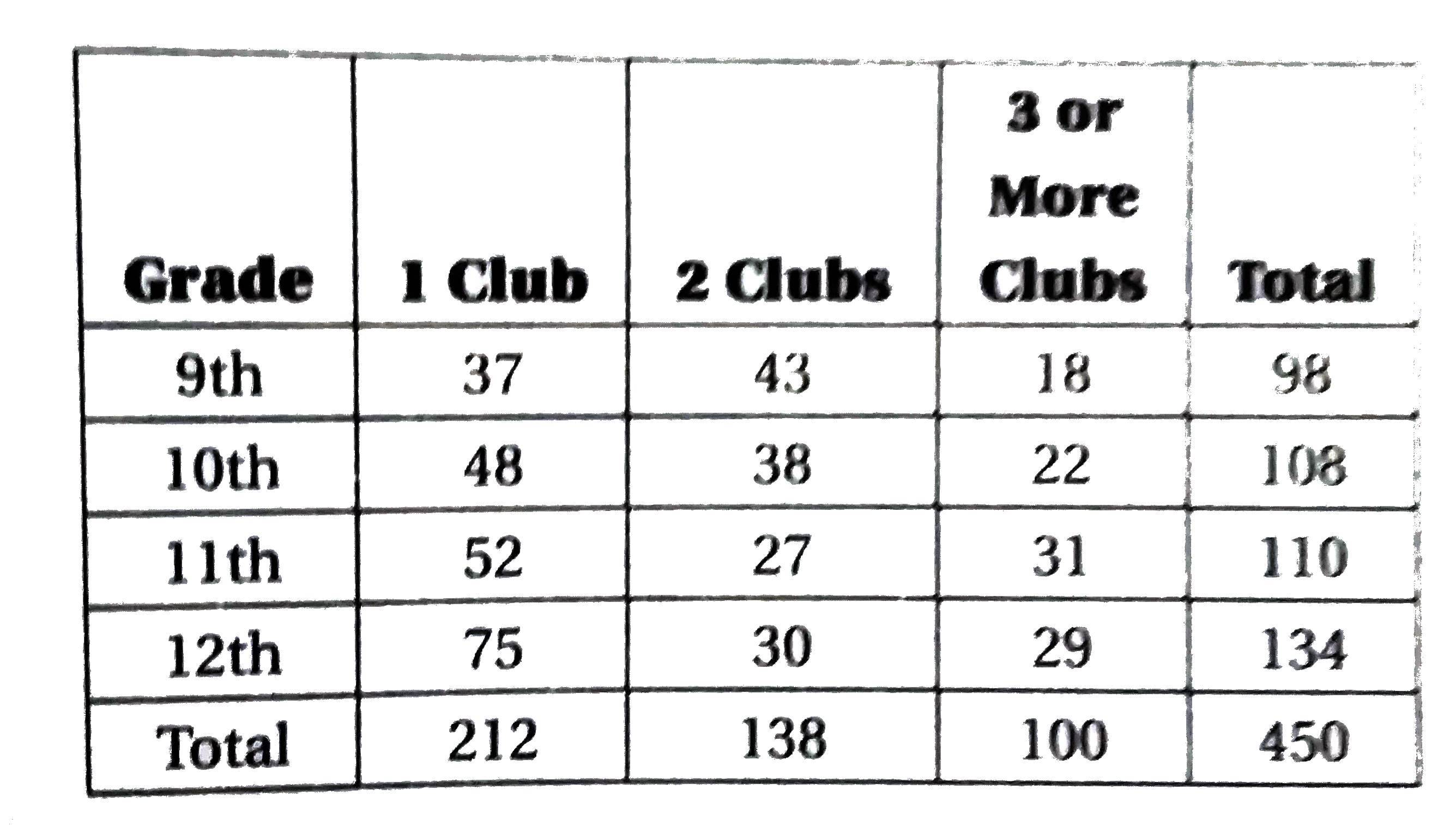
Question 4-6 refer to the above table, which summarizes the result of a survey of the student body of a high school about club membership in which each student enrolled in the high school enumerated the clubs in which they were members.
Q. If a student is selected at random, what is the probability that the student is either a 9th grade student or belongs to 3 or more clubs?View Solution
Knowledge Check
- Question 1 - Select One
Results on the Bar Exam of Law School Graduates
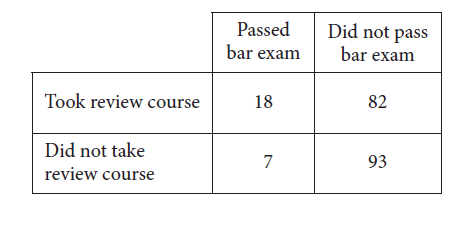
The table above summarizes the results of 200 law school graduates who took the bar exam. If one of the surveyed graduates who passed the bar exam is chosen at random for an interview, what is the probability that the person chosen did not–––– take the review course?A1825B725C25200D7200 - Question 2 - Select One
The Harrisburg Recreation Center recently changed its hours to open 1 hour later and close 3 hours later than it had previously. Residents of Harrisburg age 16 or older were given a survey and 560 residents replied. The survey asked each resident his or her student status (high school, college, or nonstudent) and what he or she thought about the change in hour (approve, disapprove, or no opinion). The results are summarized in the table below.

Suppose a person will be chosen at random from these 560 residents. Which of the following values is closest to the probability that the person chosen will NOT be a high student and will NOT have replied with no opinion?A0.06B0.09C0.44D0.83 - Question 3 - Select One
"The future of this republic is in the hand of the american voter". The statement above, made by the 34th president of the United states, paints a dismal picture when one considers the trends Line of the american youth. Those under the age of 35, in general, do not vote, do not participate in politics and frankly have no interests or trust in the governmnent itself. The retreat of youngsters from the political realms can be seen in election turnouts surely, but it can be also be noted in the miniscule numbers of young americans who identify as either Democrates or Republician. It is not only disinterest but also distaste that keep the next generation of representatives far from the poll booths and even further from office. In fact, a recently published book Running from Office: Why young American are Turned Off to Politics fround that only about ten percent of high school and university students would even consider running for federal positions at the highest. It might be easy to chalk up the younger generation as careless and unconcerned and altoghther misdirected, but that's the easy way out and it is flawed. Students are largely civic-minded, they volunteer, worry about public politics, and een congregrate to debate solutions to everything from environmerntal issues to human rights to healthcare. Significant events like the war in iran or Barack Obama running for president or gay marriage rights may generate an influx in youth participation, but overall, young voters are disengaged from american democracy and looking at other ways of tracking society's problems. It is not that they are merely apathetic, but that they have lost faith in electrol politics and are highly suspicious of party labels. If it is distrust and suspician that kep youngaters away, the U.S must ask what has changed to trigger this worrying trend. One doesn't have to prepare extensive research methods to find that today's millenials view themselves as in an altogether worse situations than that of their parents or grandparents. Widespread opinion has them in a bitter, unrewarding job market bankrupted by the university and crushed underneath a stifling national debt. Their path is difficult and uncertain at best , behind these obstacles lies an inefficient and wasteful government that they are less than anticipatory to inheit. The aforementioned book found that 25% of studernts-aged American showed absolute indifference to politics. More worrying were 60% who held negative views of politics, avoided the subject at all costs and thought of all politician as devious and untrustworthy. More and more American are shunning away from the loaded labels of "consecutive" and "laberal" instead finding themselves somewhere in the middle, society librel but fiscally conservative. Alienated by the two-party system, young Americans would rather not be included in either disagreeable side. Disinterested in a bleak of more debt and less freedom, and wary of aligning themselves within partisanship, today's youth are doubtfull of a government that promises few of the assurance it once pldged. Naturally, this trend is dispuieting for a nation that depends on its voters and an interest in representation, both of which are in a state of determination. Yet, some may applaud the veer from partisanship a phenomena that has left more undone than accoumplished. Still, if democracy is a survive, something must be done to align the cynical millennials with a system that desperately needs their interference.
Q. What is the overall point of the essay?Ato argue against the continuation of the two-party political systemBto raise specific concerns about the lack of millennial political engagmentCto suggest that mandatory voting would alleviate much of the skepticism towards the political processDto explain why millennials are more intrested in pursuing political office than people from past generations
A polling agency recently surveyed 1,000 adults who were selected at random from alargecity and asked each of the adults,“Are you satisfied with the quality of air in the city?”Of those surveyed,78 percent responded that they were satisfied with the quality of air in the city. Based on the results of the survey, which of the following statements must be true?
I. Of all adults in the city,78 percent are satisfied with the quality of air in the city.
II. If another 1,000 adults selected at random from the city were surveyed,78 percent of them would report they are satisfied with the quality of air in the city.
III. If 1,000adults selected at random from a differentcity were surveyed,78percent of them would report they are satisfied with the quality of air in the cityView Solution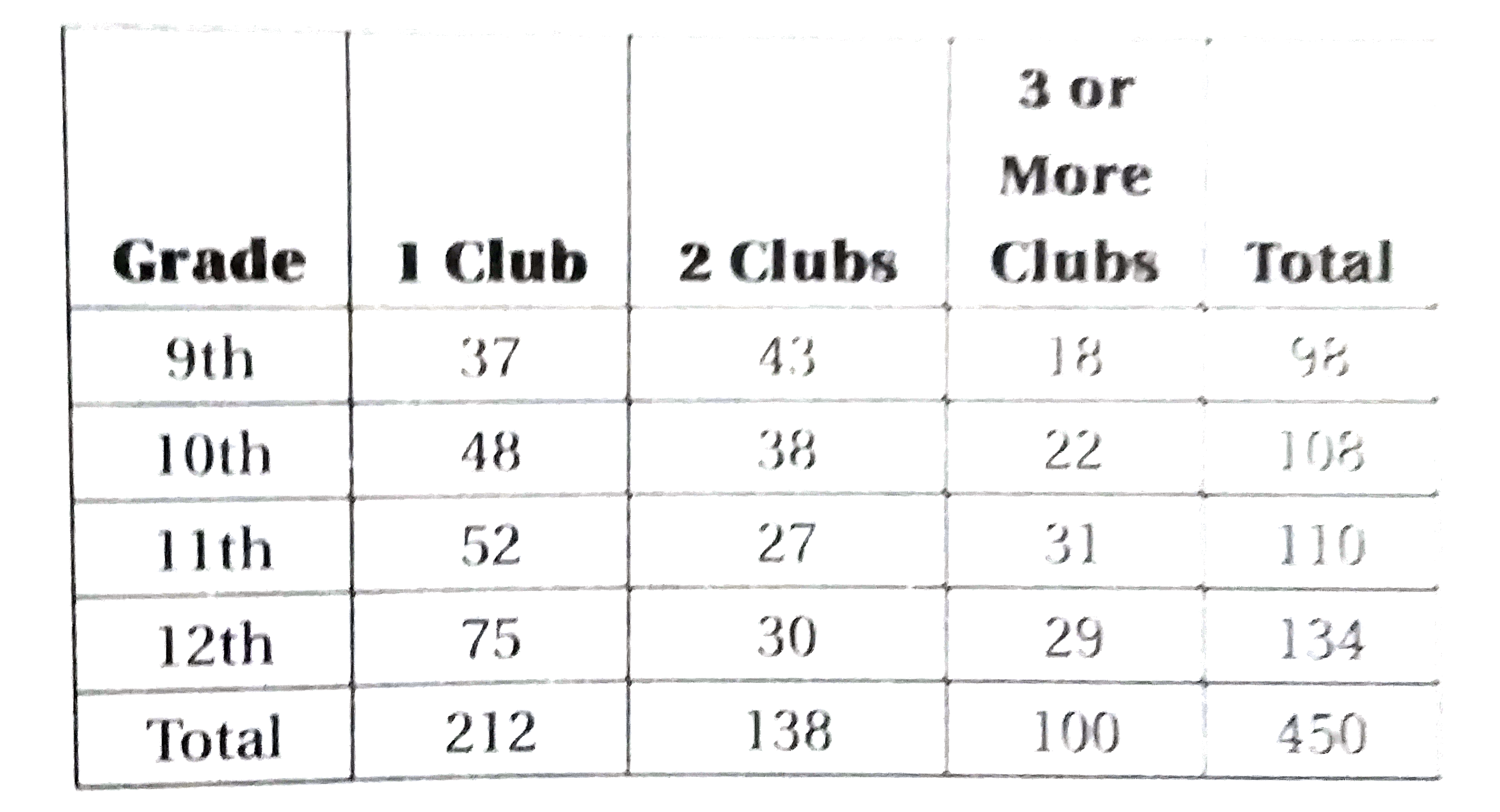
Question 4-6 refer to the above table, which summarizes the result of a survey of the student body of a high school about club membership in which each student enrolled in the high school enumerated the clubs in which they were members.
Q. If 28% of the students who are enrolled in this school belong to at least two clubs, how many students who are enrolled in this school did not participate in the survey?View Solution"The future of this republic is in the hand of the american voter". The statement above, made by the 34th president of the United states, paints a dismal picture when one considers the trends Line of the american youth. Those under the age of 35, in general, do not vote, do not participate in politics and frankly have no interests or trust in the governmnent itself. The retreat of youngsters from the political realms can be seen in election turnouts surely, but it can be also be noted in the miniscule numbers of young americans who identify as either Democrates or Republician. It is not only disinterest but also distaste that keep the next generation of representatives far from the poll booths and even further from office. In fact, a recently published book Running from Office: Why young American are Turned Off to Politics fround that only about ten percent of high school and university students would even consider running for federal positions at the highest. It might be easy to chalk up the younger generation as careless and unconcerned and altoghther misdirected, but that's the easy way out and it is flawed. Students are largely civic-minded, they volunteer, worry about public politics, and een congregrate to debate solutions to everything from environmerntal issues to human rights to healthcare. Significant events like the war in iran or Barack Obama running for president or gay marriage rights may generate an influx in youth participation, but overall, young voters are disengaged from american democracy and looking at other ways of tracking society's problems. It is not that they are merely apathetic, but that they have lost faith in electrol politics and are highly suspicious of party labels. If it is distrust and suspician that kep youngaters away, the U.S must ask what has changed to trigger this worrying trend. One doesn't have to prepare extensive research methods to find that today's millenials view themselves as in an altogether worse situations than that of their parents or grandparents. Widespread opinion has them in a bitter, unrewarding job market bankrupted by the university and crushed underneath a stifling national debt. Their path is difficult and uncertain at best , behind these obstacles lies an inefficient and wasteful government that they are less than anticipatory to inheit. The aforementioned book found that 25% of studernts-aged American showed absolute indifference to politics. More worrying were 60% who held negative views of politics, avoided the subject at all costs and thought of all politician as devious and untrustworthy. More and more American are shunning away from the loaded labels of "consecutive" and "laberal" instead finding themselves somewhere in the middle, society librel but fiscally conservative. Alienated by the two-party system, young Americans would rather not be included in either disagreeable side. Disinterested in a bleak of more debt and less freedom, and wary of aligning themselves within partisanship, today's youth are doubtfull of a government that promises few of the assurance it once pldged. Naturally, this trend is dispuieting for a nation that depends on its voters and an interest in representation, both of which are in a state of determination. Yet, some may applaud the veer from partisanship a phenomena that has left more undone than accoumplished. Still, if democracy is a survive, something must be done to align the cynical millennials with a system that desperately needs their interference.
Q. accourding to the information in the graph, during what year were the voter turnout rates of americans ages 65 and older Americans ages 18-24 closest to the another?View Solution"The future of this republic is in the hand of the american voter". The statement above, made by the 34th president of the United states, paints a dismal picture when one considers the trends Line of the american youth. Those under the age of 35, in general, do not vote, do not participate in politics and frankly have no interests or trust in the governmnent itself. The retreat of youngsters from the political realms can be seen in election turnouts surely, but it can be also be noted in the miniscule numbers of young americans who identify as either Democrates or Republician. It is not only disinterest but also distaste that keep the next generation of representatives far from the poll booths and even further from office. In fact, a recently published book Running from Office: Why young American are Turned Off to Politics fround that only about ten percent of high school and university students would even consider running for federal positions at the highest. It might be easy to chalk up the younger generation as careless and unconcerned and altoghther misdirected, but that's the easy way out and it is flawed. Students are largely civic-minded, they volunteer, worry about public politics, and een congregrate to debate solutions to everything from environmerntal issues to human rights to healthcare. Significant events like the war in iran or Barack Obama running for president or gay marriage rights may generate an influx in youth participation, but overall, young voters are disengaged from american democracy and looking at other ways of tracking society's problems. It is not that they are merely apathetic, but that they have lost faith in electrol politics and are highly suspicious of party labels. If it is distrust and suspician that kep youngaters away, the U.S must ask what has changed to trigger this worrying trend. One doesn't have to prepare extensive research methods to find that today's millenials view themselves as in an altogether worse situations than that of their parents or grandparents. Widespread opinion has them in a bitter, unrewarding job market bankrupted by the university and crushed underneath a stifling national debt. Their path is difficult and uncertain at best , behind these obstacles lies an inefficient and wasteful government that they are less than anticipatory to inheit. The aforementioned book found that 25% of studernts-aged American showed absolute indifference to politics. More worrying were 60% who held negative views of politics, avoided the subject at all costs and thought of all politician as devious and untrustworthy. More and more American are shunning away from the loaded labels of "consecutive" and "laberal" instead finding themselves somewhere in the middle, society librel but fiscally conservative. Alienated by the two-party system, young Americans would rather not be included in either disagreeable side. Disinterested in a bleak of more debt and less freedom, and wary of aligning themselves within partisanship, today's youth are doubtfull of a government that promises few of the assurance it once pldged. Naturally, this trend is dispuieting for a nation that depends on its voters and an interest in representation, both of which are in a state of determination. Yet, some may applaud the veer from partisanship a phenomena that has left more undone than accoumplished. Still, if democracy is a survive, something must be done to align the cynical millennials with a system that desperately needs their interference.
Q. As used in line 23, the phrase"chalk up" most closely meansView Solution"The future of this republic is in the hand of the american voter". The statement above, made by the 34th president of the United states, paints a dismal picture when one considers the trends Line of the american youth. Those under the age of 35, in general, do not vote, do not participate in politics and frankly have no interests or trust in the governmnent itself. The retreat of youngsters from the political realms can be seen in election turnouts surely, but it can be also be noted in the miniscule numbers of young americans who identify as either Democrates or Republician. It is not only disinterest but also distaste that keep the next generation of representatives far from the poll booths and even further from office. In fact, a recently published book Running from Office: Why young American are Turned Off to Politics fround that only about ten percent of high school and university students would even consider running for federal positions at the highest. It might be easy to chalk up the younger generation as careless and unconcerned and altoghther misdirected, but that's the easy way out and it is flawed. Students are largely civic-minded, they volunteer, worry about public politics, and een congregrate to debate solutions to everything from environmerntal issues to human rights to healthcare. Significant events like the war in iran or Barack Obama running for president or gay marriage rights may generate an influx in youth participation, but overall, young voters are disengaged from american democracy and looking at other ways of tracking society's problems. It is not that they are merely apathetic, but that they have lost faith in electrol politics and are highly suspicious of party labels. If it is distrust and suspician that kep youngaters away, the U.S must ask what has changed to trigger this worrying trend. One doesn't have to prepare extensive research methods to find that today's millenials view themselves as in an altogether worse situations than that of their parents or grandparents. Widespread opinion has them in a bitter, unrewarding job market bankrupted by the university and crushed underneath a stifling national debt. Their path is difficult and uncertain at best , behind these obstacles lies an inefficient and wasteful government that they are less than anticipatory to inheit. The aforementioned book found that 25% of studernts-aged American showed absolute indifference to politics. More worrying were 60% who held negative views of politics, avoided the subject at all costs and thought of all politician as devious and untrustworthy. More and more American are shunning away from the loaded labels of "consecutive" and "laberal" instead finding themselves somewhere in the middle, society librel but fiscally conservative. Alienated by the two-party system, young Americans would rather not be included in either disagreeable side. Disinterested in a bleak of more debt and less freedom, and wary of aligning themselves within partisanship, today's youth are doubtfull of a government that promises few of the assurance it once pldged. Naturally, this trend is dispuieting for a nation that depends on its voters and an interest in representation, both of which are in a state of determination. Yet, some may applaud the veer from partisanship a phenomena that has left more undone than accoumplished. Still, if democracy is a survive, something must be done to align the cynical millennials with a system that desperately needs their interference.
Q. The primary purpose of the paragraph in lines 55-68 is toView Solution

